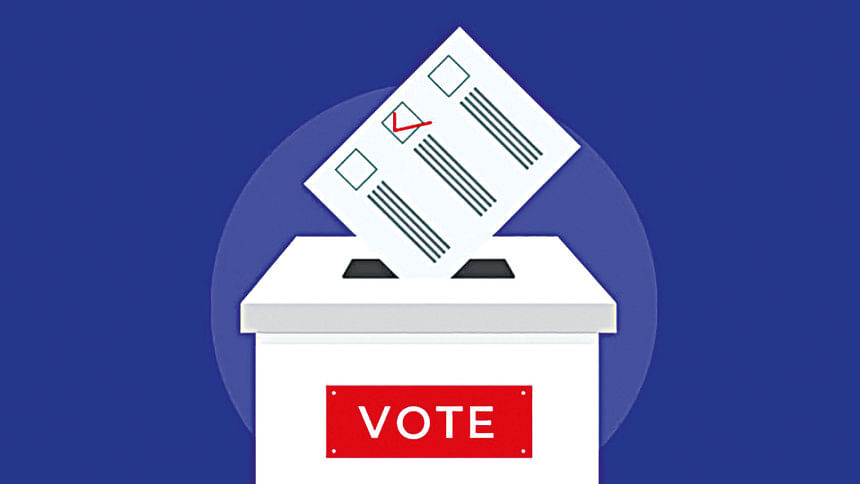Realising the voting rights of the Bangladeshi Expatriates

The right to vote is a cornerstone of any democracy. The fundamental nature of such a right places an obligation on a country to enable its citizens to vote and elect their representative. No matter where in the world a lawful citizen resides, they should retain their right to participate in the democratic process as long as they hold ties with their country. However, it is frustrating to see that over 15 million Bangladeshi citizens living abroad remain largely disenfranchised in our national elections, despite being an integral part of the country's economy and development narrative. This calls for urgent policy-legal reforms in order to guarantee voting rights of this sizable population in a meaningful manner.
Article 11 of the Constitution of Bangladesh enumerates that "the Republic shall be a democracy in which fundamental human rights and freedom and respect for the dignity and worth of the human person shall be guaranteed, and in which effective participation by the people through their elected representative in administration at all levels shall be ensured." Article 27 ensures equality before the law, and Article 122 lays down voter eligibility based on citizenship, age, registration and by the court decisions, in some cases. Nowhere does the constitution say that residence within the country's territory is a precondition to exercise the voting right. Hence, the Constitution of Bangladesh requires no amendments to afford voting rights to its citizens living abroad. For a long time, several factors such as a combination of bureaucratic inertia, logistical reluctance, shortage of trained personnel, inadequate funding, technological constraints, and most significantly lack of staunch political contributed to the delay in actualising this constitutional right of the expatriates.
The de facto disenfranchisement began with the Electoral Rolls Ordinance of 1982, particularly through Section 8, which described the term "resident" as a person who "ordinarily resides" in an electoral area or constituency. This narrowly tailored definition of residency effectively disenfranchised even those expatriates who physically returned to Bangladesh during elections to get registered and vote, as they were not considered to "ordinarily reside" in any constituency for that matter. This matter didn't go unquestioned, but was challenged in the case of Ali Reza Khan v Bangladesh Election Commission (1997) 17 BLD 641. In that case, the High Court Division of the Supreme Court of Bangladesh held that if a person who is temporarily residing abroad, is a permanent resident of Bangladesh and has fulfilled all other conditions required by law to be a voter, is entitled to be registered as a voter in Bangladesh.
After that, a significant legislative reform was brought about in August 2009, when Parliament repealed the 1982 Ordinance altogether. In its place, the Voter List Ordinance of 2007 was enacted with a forward-looking provision: "Bangladeshis residing abroad would be deemed residents of the constituency where they had previously lived or where they still maintained ancestral property". This legal reform marked a pivotal moment; it was the first concrete step toward recognising the voting rights of the expatriates within Bangladesh's electoral framework.
According to the International Institute for Democracy and Electoral Assistance (International IDEA), based in Stockholm, over 126 countries and territories worldwide have already extended some form of voting rights for their expatriate citizens. Bangladesh has no reason to lag behind in this global progress. At present, as Bangladesh goes through a political transition and as a new spirit of reform and inclusivity rises in the wake of the July–August mass uprising, a window of opportunity for meaningful institutional reforms has opened. Notably, the interim government has already expressed its commitment to ensuring voting rights of expatriate Bangladeshis.
As part of ongoing reformation process, the Electoral Reform Commission has recently proposed four possible methods for enabling overseas voting. One proposed method is In-Person Voting, which requires voters to be physically present at a designated polling location on election day- feasible at embassies or consulates. Another option is Postal Voting which allows voters to cast their ballots via post from their country of residence. The third alternative proposal is Proxy Voting, which allows a designated proxy in Bangladesh to vote on behalf of the expatriate voters, based on prior nomination and legal authorisation. Finally, the Commission is also exploring Electronic Voting that enables voting through digital means, such as Electronic Voting Machines (EVMs) or Internet-based systems (I-voting).
Implementing such a system will mark a tipping point for democracy in our country. It would not only strengthen democratic participation but also enhance the legitimacy of governance and reinforce inclusivity within the electoral system. By embracing this long-overdue reform, Bangladesh can take a pivotal step toward a more inclusive, participatory, and globally connected democracy- a vision truly reflective of its constitutional values and democratic ideals.
The writer studies law at the University of Dhaka.

 For all latest news, follow The Daily Star's Google News channel.
For all latest news, follow The Daily Star's Google News channel. 



Comments